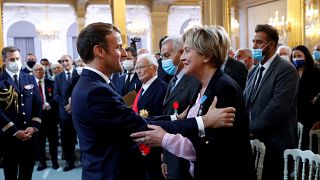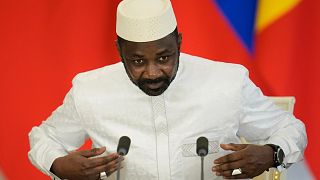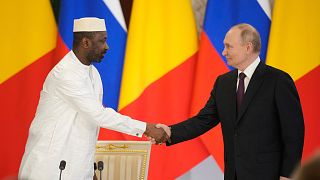Mali
French Defence Minister Florence Parly met her counterpart in Mali on Monday, amid rising tensions with the war-torn Sahel state over reports it plans to hire Russian mercenaries.
Former colonial power France last week warned Bamako against signing a deal with private-security firm Wagner, after claims that Mali's army-dominated government is close to hiring 1,000 paramilitaries.
"We had a frank, direct and complete exchange," Parly told reporters after meeting Mali's Defence Minister Colonel Sadio Camara, who didn't comment.
France has thousands of troops stationed in Mali. Before the meeting, Parly told journalists that she was travelling to the country to reiterate her government's opposition to Wagner.
"We will not be able to cohabit with mercenaries," she warned.
The Russian private-security firm is considered close to Russian President Vladimir Putin, and has been accused of committing abuses.
On Sunday, Mali's foreign ministry stated -- without naming any country or Wagner -- that it "would not allow any state to make its choices".
Parly's visit comes after months of tense relations between Mali and France, exacerbated by two military coups committed within the space of one year in the vast semi-arid nation.
Among other issues, France is concerned about military strongman Colonel Assimi Goita's commitment to hold swift elections to return Mali to civilian rule.
Paris is also planning a major reduction in troop numbers across the Sahel, with several French army bases in northern Mali set to close by early 2022.
Last week, Malian interim Prime Minister Choguel Kokalla Maiga suggested that talks between Bamako and Wagner were motivated by the French drawdown.
"There are partners who have decided to leave Mali to withdraw to other countries, there are areas that are abandoned," he said.
- Russian influence -
Russian paramilitaries, private-security instructors and companies have grown increasingly influential in Africa in recent years, particularly in the conflict-ridden Central African Republic (CAR).
Early this summer, the United Nations accused Wagner contractors of committing abuses in CAR.
A UN official who requested anonymity told AFP that the number of those accusations has decreased, however.
Last week, UN Under-Secretary-General for Peace Operations Jean-Pierre Lacroix insisted that any partnership between Mali and Wagner must be "carried out in full respect for human rights".
The United Nations has 13,000 peacekeepers in the country of 19 million people.
Germany, which also has troops in Mali, has for its part warned Bamako that it will reconsider its deployment should the government strike a deal with Wagner.
Contacted by AFP, the Malian defence ministry acknowledged the existence of talks with Wagner.
- Doubtful elections -
Already battling a jihadist insurgency, Mali slid into political turmoil last year, culminating in a military coup in August 2020 against president Ibrahim Boubacar Keita.
Under the threat of sanctions, the military then appointed an interim civilian government tasked with steering the country back to democratic rule.
But army strongman Colonel Assimi Goita overthrew the leaders of that interim government in May -- in a second putsch -- and was later declared interim president himself.
The move drew broad international condemnation and soured already tense relations with France.
President Macron announced his troop reductions in July in the aftermath of the second coup.
Goita has pledged to respect a February 2022 deadline for civilian elections set by the previous interim government.
But rampant insecurity in Mali, and an apparent lack of preparations for elections, has cast doubt on the reform timetable.
Parly told reporters on Monday that there needed to be a will in Mali towards transitioning back to democratic rule.
"Where there is a will, there is a way," she said. The defence minister also stressed that France remained militarily committed in the country.











01:00
Pix of the Day: July 10, 2025
01:00
Pix of the Day: July 8, 2025
02:15
Small boat crossings by migrants in northern France on the rise
02:22
Cameroonian marine conservationists trained as scientific divers
01:02
Madgascar's President in Paris to discuss disputed Indian Ocean islets
01:41
UN warns of looming famine in Sudan, Gaza and 3 other global hunger hotspots